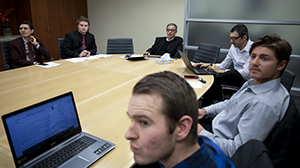UofGH team advances to championship round of NIBS Worldwide Case Competition in Germany
For the third year in a row, a team of four University of Guelph-Humber students have qualified for the championship round of the Network of International Business Schools (NIBS) Worldwide Case Competition.

Now in its 25th year, NIBS is considered to be the world’s leading international business case competition. This year’s competition takes place from March 1-6 at Reinhold Würth University in Künzelsau, Germany, and marks the first time a UofGH case competition team has travelled to Europe.
This year’s UofGH team – which consists of Business students Kevin Ferreira, Jessica Gomes, Alexis Del Papa, and Roma Patel – is one of only 16 schools worldwide to qualify for the championship round. They will be defending the championship that UofGH won last year in Charlottetown, P.E.I., as they face off against students from the Netherlands, Hungary, United States, Canada, Denmark, China, United Kingdom, Belgium, and Australia.
The team first had to get through the challenging qualifying round, which took place between November 7 and 21, 2019. For the qualifying round, the team had to download and complete a case analysis within eight hours. The 16 qualifying teams were then chosen to move onto the championship round.
“To make the top 16 schools for three consecutive years is incredible, and now for our students to have the opportunity to go to Europe and experience the German culture will be an exciting and rewarding experience for the team,” says Justin Medak, Assistant Program head of Business at UofGH, who personally trains and prepares the University’s case competitors. “I am so proud of all the research, studying, and preparation the team is doing.”
While the team is excited to travel to Europe and become immersed in the German culture, they are completely focused on their goal of winning the competition and defending their title.
“I’ve never been to Europe so going to Germany and immersing myself as much as possible into their culture will be very memorable. But the goal is to bring back that trophy!” says Ferreira.
“Qualifying for this competition means GAME ON. We are the defending champs of this title, and we have the opportunity to bring back a trophy to the University of Guelph-Humber,” agrees Patel.
Intensive preparation
The team is currently undergoing rigorous preparation for the championship round, which began right after fall exams ended in December.
“The preparation is very intensive – so much so, that the students were in over the holiday period, having full days of studying and preparation,” says Medak. “So when exams ended and all the students went home for the holidays, the four team members selected for this case competition were on campus studying, doing practice sessions, researching, and it was very intensive, but it’s also a rewarding experience for them.”

The students have weekly practice sessions, where they are locked down for four hours and work together to analyze a new case each week. This is followed by a 20-minute presentation, a 10-minute question-and-answer session, and two-and-a-half hours of feedback from Medak. The students also prepare outside of the practice sessions by doing additional readings, writing reflections on their learnings, and reviewing videos of successful case competition performances. “The goal of the training sessions is to expose them to as many different types of business scenarios and situations as possible to try to make them more adaptable to anything that they could see at the competition,” says Medak.
Building valuable skills
Participating in case competitions builds many skills, such as presentation, critical analysis, skills, and teamwork.
“I find that the commitment required is definitely more intensive than I thought it would be, which was a struggle at first, but has proven to be very worthwhile,” says Gomes. “It has taught me how to present more fluently, and has encouraged me to think on my feet, while helping me to refine my business knowledge in a more practical setting. It is an excellent opportunity to further develop your skills and grow your network.”
“I think it is important for people to know how much time and dedication goes into preparation for these cases. If you are interested in case competitions and willing to put the work in, it will be very rewarding,” adds Del Papa. “Participating in case competitions has taught me that when you put the time in, you will see consistent growth in yourself and will learn new skills that will be applicable in the future.”

“Being a part of case competitions has taught me a lot, but the main takeaway would be if you put in the time and really work towards something it can be achieved,” agrees Ferreira. “I think everyone should get involved in case competitions because they allow you to grow as a person by challenging yourself, meeting new people, allowing future employers to see you are trying to better yourself and, it’s just fun! My advice: stop thinking just do it! Join DECA, make friends and create memories.”
“Case competitions really teach you the value of teamwork, and I really mean this. We do a lot of group work in school, but a case competition team is different,” says Patel. “You have to learn to trust your teammates; you have to bounce off of each other to be successful. Those three hours only become useful when you learn to work with the team, and this skill of teamwork is essential everywhere.”








